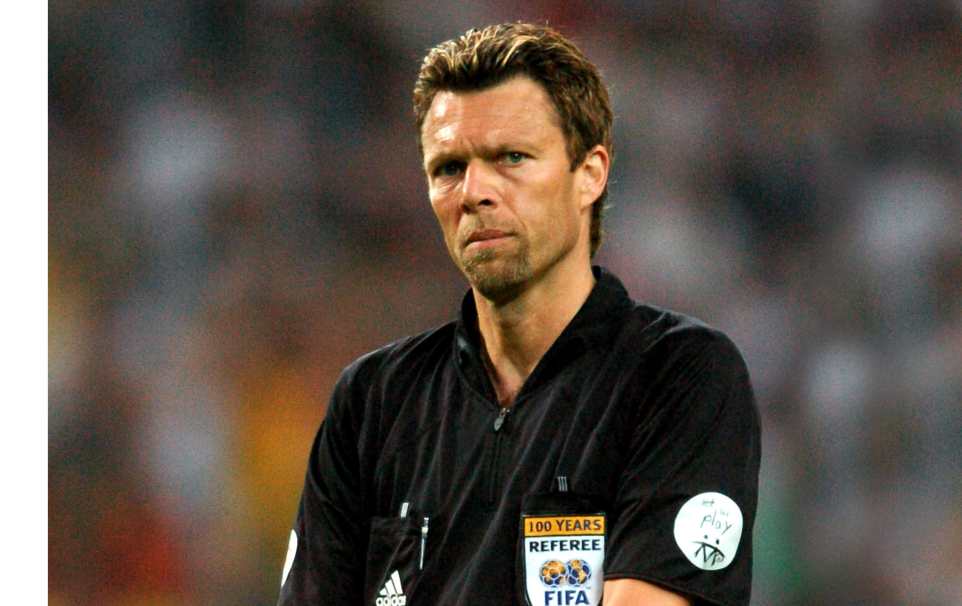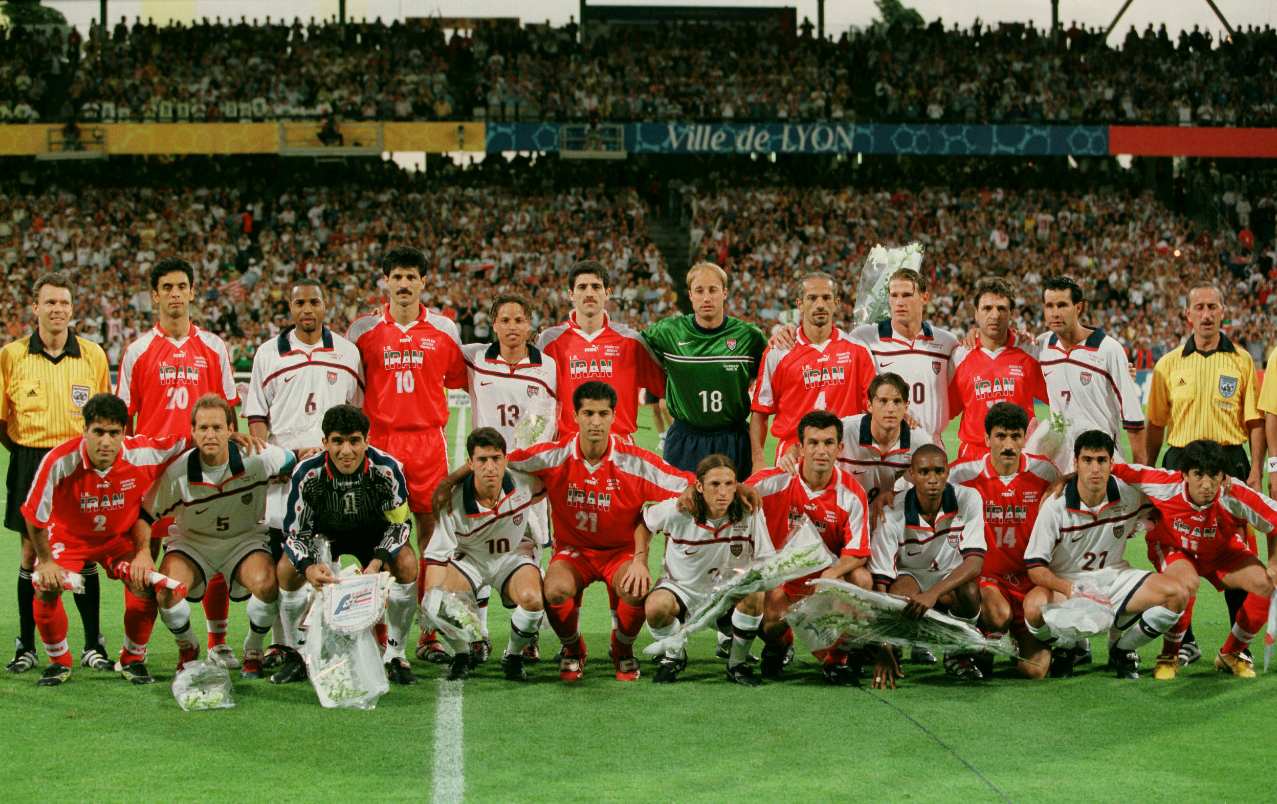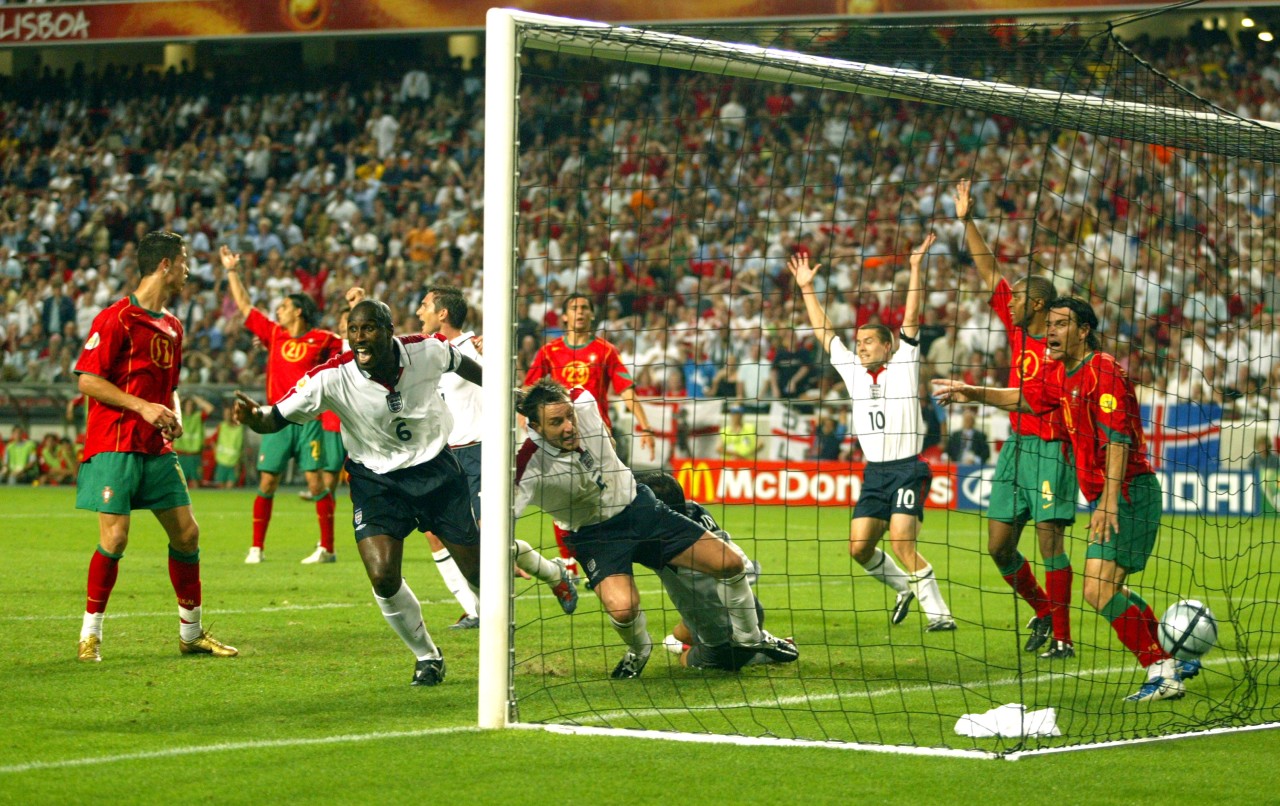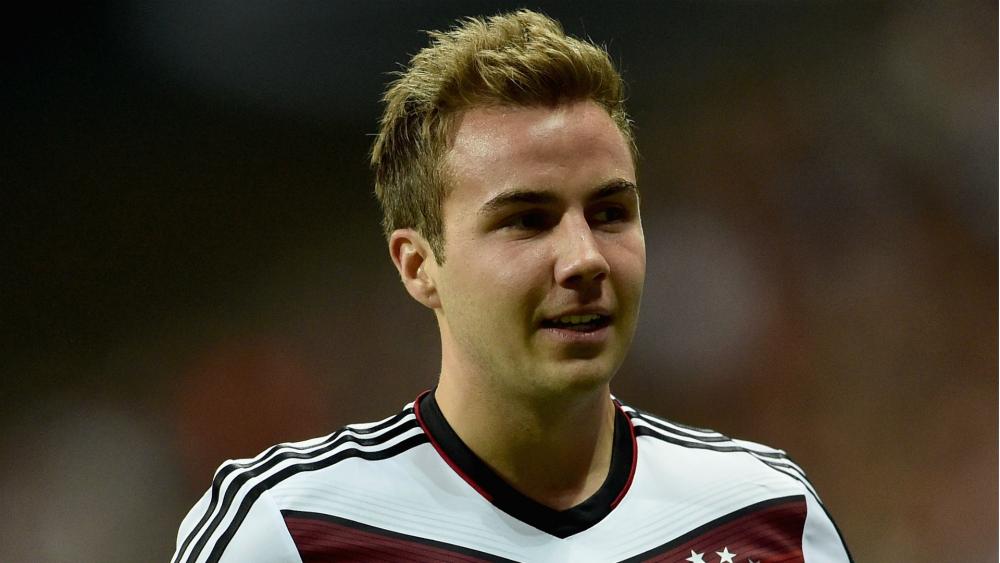England vs Portugal referee Urs Meier’s Euro 2004 hell: “I woke up to find 16,000 emails in my inbox. They were all in English – death threats and insults”
Referee Urs Meier found himself the unwitting victim of tabloid hatred after disallowing Sol Campbell’s late goal for England against Portugal at Euro 2004: intimidated, abused and then bundled into hiding. This is his side of the story...

This feature by Urs Meier first appeared in the Summer 2021 issue of FourFourTwo magazine. Subscribe now!
The first time I had to deal with death threats came nine months before Euro 2004. It was a qualifier between Denmark and Romania, where the visitors needed a win in their last game to qualify. Romania were the better team by miles too, and 2-1 up as the game entered four minutes of injury time. But they started time-wasting to an obscene level, with players walking really slowly for substitutions. I had to book one of them for taking so long over a corner, and kept telling them that I’d be adding that time onto the end, but they carried on.
You can guess what happened next: after 94 minutes and 36 seconds, Denmark scored to all but qualify at Romania’s expense.
They had nobody to blame but themselves, but the following day in Copenhagen, 5,000 of their fans protested outside the Swiss embassy against me. Romanian tabloids claimed that the penalty I’d awarded the Danes in the first half had been soft, and that their equaliser had been offside, but none of it was true.
Some media outlets found my email address and published it. I received thousands of death threats, which was the first time I’d experienced anything like that. I was scared of what their fans might do if they saw me in Copenhagen, so I called the police and asked them to protect me because I had a really bad feeling about going home. Fortunately, nothing happened – but sadly it wasn't the last time.
Picking up a whistle
Growing up, I’d dreamed of becoming a footballer. I wanted to play at San Siro and score the winning goal for Switzerland in the dying minutes against Italy. I was a decent player, too, and scored a lot of goals at youth level. My father had wanted me to become a gymnast – I trained intensely for six years as a youngster, but it was never my passion. I wasn’t quite strong enough, I didn’t have the muscles and my wrists were too skinny.
I was 14 when I realised that I didn’t have what it took to become a professional. It was then that I wanted to be a referee: if I couldn’t play at San Siro, then I’d at least walk onto that pitch wearing black one day. You’re not allowed to take a referee’s course until you’re 18 in Switzerland, but I’d made my mind up four years earlier.
Get FourFourTwo Newsletter
The best features, fun and footballing quizzes, straight to your inbox every week.
When I took my first course, we were each given a questionnaire. One of the questions was, ‘What are your goals?’ I wrote that it was my dream to referee at the 1998 World Cup. That was in ’77. I wanted to referee at a tournament 21 years away.
I started out in the Swiss lower leagues and had to work my way up slowly. It was frustrating. I would be the best referee in a division, but because I was the youngest, the Swiss FA would promote an inferior official ahead of me. ‘You’ve got time,’ they kept saying – but I didn’t understand. I wanted to get to the top as quickly as possible.
Years later, when I finally got my chance to work for FIFA and UEFA, they could see I had a lot of experience for someone so young. They could tell how hard I had worked. That was my grounding as a referee – every house needs some good foundations, and those difficult years refereeing in the Swiss lower leagues were mine.
On the side I worked as a salesman – originally for various firms, but I started up my own business as soon as I could. We sold household items: washing machines, dryers, irons... that sort of thing. It went well, and I eventually employed 25 people. It gave me the time to train as a referee, and attend meetings and games.
In the end, there were two Swiss referees in contention for a spot at France 98: myself and another more experienced official. I was one of the younger referees under consideration, part of a new generation. My rival and I were very fair with one another – we kept in contact and spoke highly of each other in the press. I found out I’d been chosen ahead of him in January 1998, though – it was an incredible feeling.

I’d seen the World Cup draw a month earlier, and as soon as the USA and Iran were put together, I shouted, ‘That’s it. That’s my game!’ It would be one of the most politically charged football matches in history. Long before we were informed about which games we’d be getting, I started training for that match.
Shortly before the tournament, all of the selected referees spent a week training together near Paris. At a big dinner afterwards, we each received an envelope containing our fixtures. Before they were brought out, I told everyone I wanted USA vs Iran. They asked me why not Brazil, England or France? But I said there would be time for those teams later on in my career. I wanted to officiate the most political, challenging match of the tournament. The envelopes came round and I told the others that I didn’t need to open mine. I knew. One eventually took my envelope and opened it for me. ‘How did you know?!’ he said, stunned.
The night before the game, we had a security meeting with officials from both countries, along with a FIFA delegate. ‘Gentleman,’ he said. ‘Tomorrow is only a football match.’ Everyone around the table nodded in agreement, but then he repeated it. He wanted to make that clear. During the meeting, though, I recommended that we take the team photos ahead of kick-off with all the players mixed in together. FIFA said they would allow it, but only without the match officials for some reason. After we left, I told my assistants that we were going to be in that photo no matter what FIFA said – it had been my idea, after all.
Before kick-off, my assistants and I stood either side of the USA and Iran players and we were in that picture (above). There were twice as many photographers as you’d usually expect, with political reporters there too. Everyone in the stadium knew they were witnessing a historical moment. The roof came off the place, and I realised something very special was taking place that day. The photo went around the world – but sadly, the one FIFA still distributes has the referees edited out.
The game itself was an edgy affair, and I actually had a huge slice of luck following a decision not to award a penalty to Iran. I decided that their forward had flown into the air a little dramatically for my liking. I could have given it and sent the American goalkeeper off, but that wouldn’t have been in keeping with the spirit of the game. Iran went on to win the match 2-1 anyway after a fantastic goal – a far better way to win it.
Ultimately, the game concluded with no red cards, which is what the occasion needed. Both teams received a fair play award from FIFA and everything went wonderfully. I had achieved one of my dreams – eight years after walking out as an assistant at San Siro for Milan vs Mechelen in the Champions League – but also made a reputation as the man for a big fixture.
I later refereed USA vs South Korea at the 2002 World Cup, which was another tense affair due to the war in the 1950s. Young people in Korea still had a very critical view of America, and it was interesting that their fanzone was right next to the US embassy in Seoul. That game went smoothly, too.
It’s important to realise the part my nationality played in my career. A German reporter once wrote of me, ‘Urs Meier is double neutral’ – he’s a referee and he’s Swiss. It was a huge help in terms of getting important games at major tournaments.
People forget I was also selected to officiate the semi-final between South Korea and Germany for that reason. You always feel a little more pressure when refereeing the home country at a major tournament, but the previous two fixtures involving South Korea – against Italy in the quarter-finals and Spain in the last 16 – had featured catastrophic performances by the match officials. Let’s just say the hosts appeared to be getting a lot of luck when it came to key decisions.
FIFA were under pressure to show that there was no bias. President Sepp Blatter wanted to reassert credibility, and personally decided to give me the semi. I should never have been in contention, nowhere near that game, because I come from the German-speaking part of Switzerland and had already refereed Korea in an earlier round. But it tells you all you need to know about my impartiality.
Portuguese polemic
Two years later at Euro 2004, however, I was called a cheat. England had lost on penalties to Portugal in the quarter-finals, and I became public enemy No.1 again. First of all, though, we need to be absolutely clear about one thing: despite what the English tabloids said, I made the correct decision in Lisbon. It wasn’t Sol Campbell who made the foul on the goalkeeper when I disallowed his header in the last minute of normal time – it was John Terry.
The scenario is actually still included in German refereeing textbooks, because it represents a good example of making a correct call based on something you can’t see; something happening elsewhere, out of your line of vision. Because, to be honest, I didn’t actually see any foul that night – but I knew there was one. My gut told me that something in the picture wasn’t right, and I’d learned to trust that feeling over a 20-year career.
It all just felt too easy. Where was the goalkeeper, Ricardo? I hadn’t seen his hands go up for the ball. Why couldn’t he get his hands up?
I made my decision quickly and blew for a foul. No goal. The England players were absolutely furious – Campbell especially, but the whole team. To make matters worse, Portugal took a quick free-kick and were on the attack within moments. The move ended with them shooting over the bar – thank God they didn’t score or it would have been chaos.

As soon as the ball went out of play, the England players crowded around me. Campbell sprinted almost the length of the pitch to scream at me, telling me that he hadn’t fouled anyone. He demanded to know why the goal had been ruled out. I calmly explained that I knew that he hadn’t fouled anybody. I also admitted I didn’t know who’d made the foul, as I hadn’t seen what happened. He was stunned.
I have to say, though, that both teams’ behaviour was exemplary from there. England players didn’t appear to hold it against me – but sadly, the same couldn’t be said for the press. The next day, I woke up to find 16,000 emails in my inbox. They were all in English, death threats and insults. ‘I’ll kill you, you f**king arsehole!’ – that sort of thing. I scrolled down in complete astonishment. I’d gone to bed the night before thinking everything had gone well. What was going on?
The Swiss police phoned to tell me that I was in danger, and that I should lie low in Portugal. They wouldn’t be able to ensure my safety if I tried to go home. My face was on the front cover of every tabloid in England – they’d also found out my email address and published it, hence the hate mail. I deleted my entire inbox and deactivated the account. If I hadn’t, I think I’d have received more than half a million emails at the rate they were coming in.
Over the next few days, journalists hounded me. The pressure was so immense that I couldn’t leave my hotel room. Nobody from UEFA got in touch. I felt alone. Eventually, I couldn’t stay any longer – I told the police I’d take my chances at the airport and flew home days later.
When my plane touched down in Zurich, two police officers in civilian clothing were waiting to collect me on the runway. They got me from my seat, walked me out to a car, put me in the back and drove me to a town called Baden, about 20 miles outside of Zurich. I was taken to a safehouse and instructed to hide there until I was able to go home. I couldn’t even tell my family or friends where I was.
After about a week, I was allowed to travel back to where I live up in the mountains. I’d probably say that for six months after that match, whenever I travelled for work, I got a fright every time I heard English spoken near me. It was horrible.
I’m still recognised as the referee who disallowed that goal. I only got media opportunities because of The Sun and those other newspapers. So… well, thanks
Urs Meier, Euro 2004 referee
I retired six months later. At 45, it had always been my plan to stop straight after the Euros – to go out on a high – but after that, people would have thought it was fear that made me stop. I couldn’t let that happen. I even asked UEFA to give me a match in England, because I’m actually a big fan of English football. I find their fans, along with the Irish and Scottish, the fairest in the world. They understand football and understand fairness. But UEFA said no. They were scared to send me into that environment so soon after the tournament.
Not all my assignments were tense affairs, of course. I got to referee some wonderful games in my career, like the 2002 Champions League Final between Real Madrid and Bayer Leverkusen at Hampden Park.
Zinedine Zidane was already my favourite player heading into that match. Refereeing him was a pleasure; to watch him up close, to try to understand how everything could look so easy. He was a genius. You got the feeling that he didn’t even need to try – it was natural.
I was 10 metres away from him when he scored that volley. I saw the ball go wide to Roberto Carlos, and as he played the cross, I saw the ball, I saw the goal, I saw Zidane and then... boom! He connected with the ball in a way others can only dream of. These days, referees don’t blow their whistles to signal that a goal has been scored, but you still had to in 2002. That was the longest whistle of my life: peeeeeep! Inside I was going, ‘Wow! What a goal! Come on!’ It had nothing to do with the result. Even Leverkusen fans in the ground applauded it.
Beautiful moments like that couldn’t happen without the referees, though. Match officials are incredibly important, and a good game needs a good referee – to ensure it’s fair and has a good flow. A good referee can leave their character on a game with their decisions to let certain things go, to give certain fouls or, of course, to rule out certain goals. A good referee has a deep understanding of football. They need the confidence to make big decisions. It’s one of the most exciting and enjoyable jobs in the world, but it comes with great responsibility – and great consequences, too.
In hindsight, and despite all of the trouble they caused me and my family, I have to thank the English tabloids. The hate campaign they led against me was incredible PR – in Switzerland, Germany, and just about everywhere, I’m still recognised as the referee who disallowed that goal. It led to me working on German TV as a pundit at the 2006 World Cup and Euro 2008 – but I only got those opportunities because of The Sun and those other newspapers. So… well, thanks.
Interview: Ed McCambridge
Subscribe to FourFourTwo today and get a free Euro 96 shirt!
NOW READ
EURO 2020 SQUADS Every confirmed team for the 2021 tournament
QUIZ Can you name every Champions League final scorer since 2000?
Urs Meier, former referee famous for Euro 2004 controversy with England
